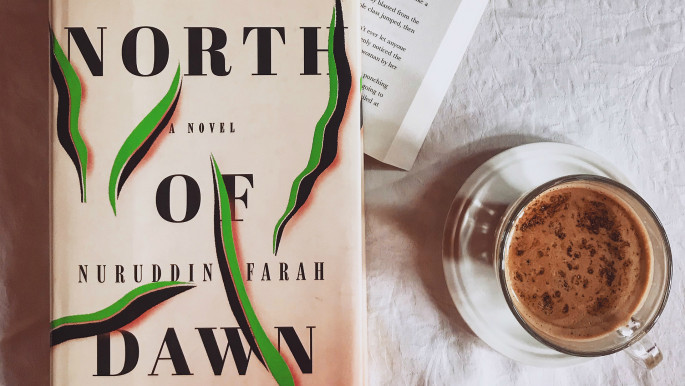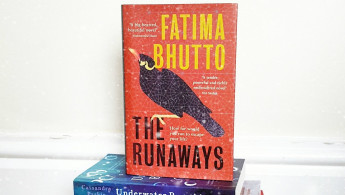The Runaways: What drives young people to join terrorist organisations?
The Runaways is best-selling author Fatima Bhutto's latest novel published in early March. Its concept, unlike the writer, wasn't new to me. It is about three young teenagers who reject the society that raised them and go to join the Islamic State group.
Verdict? I bloody loved it. I'll tell you why.
The book begins with the reader meeting Anita Rose, who is from Karachi, Pakistan. She comes from a poor family who live in a slum and has a mother who is paid to massage the rich for a living. She finds herself in their mansion, admiring their home and items, wishing for something more. The homeowner offers her a job at 16 to work for them yet she refuses to be a servant.
Anita doesn't feel like she belongs anywhere, yet at the same time has a strong sense of self. We learn from the very beginning as we meet her at the airport that she is fleeing Pakistan; we then go back and read her story. She is bullied at school, has no friends and is lonely. The family are poor. Her mother sends her to a neighbour called Osama to borrow food items. It is with this man that she forms somewhat a friendship, as he introduces her to poetry and literature alike. They talk about life and how she feels, her need to be "seen" and the desire to be "free".
Alongside Anita's character, we meet Sunny, the son of an immigrant who set up home in Portsmouth, UK. His Mother dies when he is young, and his father constantly encourages him to go for those opportunities he himself never had.
 |
The writing is so perceptive about what it means to not have your feelings acknowledged by the world, the anger that burns at inequality and injustice |  |
 |
|
| Read more from The New Arab's Book Club: The emotional debris of a suicide attack: North of Dawn tells a rare story |
Sunny doesn't feel like he fits in anywhere. He skips university and the gym, drinks alcohol and dislikes his father. He is confused about his sexuality. There is a scene where he forces himself onto a drunk girl because he is so confused and doesn't know how he feels or what he wants.
Sunny then meets his cousin Oz who sets in motion a sequence of events from which he cannot look back. Oz has just returned from Syria and puts it in Sunny's mind that he must go and fight too. Through several conversations and meetings, Sunny ends up joining a Jihadi movement and in the desert, posts on various social media platforms, his love for the war and his naive eagerness to be a man.
The final character we meet is Monty, the son of wealthy, unhappy parents who divide their time between Karachi and London. His father is a member of Karachi's elite; Monty has a poor relationship with his father who often neglects his son's needs.
Monty cannot identify with his mother either, who grows more religious every time she turns on the TV. Monty falls in love with a girl called Layla, who ends up leaving him after six months and going to the desert. He goes to follow her and that is where all three characters meet.
So many parts of this novel can be linked to the present day. Sunny becomes obsessed with his mobile phone and his posting on social media; he loves pictures of his Kalashnikov he lovingly names Rita. There is a misrepresentation with how Sunny feels compared to what he posts online and who he is trying to be.
As a British Muslim, I felt nervous about reading a book written by not only a Muslim author but also with content that is so prevalent in the media now and has such divided opinion. I feel Bhutto provides a lot of perspective about the current climate and wants the reader to see the other side of the coin.
 |
'Radicalisation' is not an overnight process and this novel clearly displays that |  |
'Radicalisation' is not an overnight process and this novel clearly displays that. It also shows that people are not always certain of the decisions they make, even if those decisions can have disastrous consequences. There is a strong sense of loss and identity in the book, of not knowing who you are and where you belong, if at all.
It takes courage to write such a powerful story. Bhutto's novel asks such poignant questions of society today. What drives young people to join terrorist organisations like the Islamic State group? How does it feel to see the distinction between the rich and the poor daily, to feel it in your bones and to not know where you fit in?
There is a twist towards the end of the novel which will leave your jaw dropping. It is a riveting story with the writer attempting to make you understand how claustrophobic young people can feel in present day society. My heart thumped near the ending, which despite being open-ended offers a level of satisfaction.
The writing is so perceptive about what it means to not have your feelings acknowledged by the world, the anger that burns at inequality and injustice, as well as the state of humanity. It is an essential read; be prepared for your eyes to be opened and your mind to be expanded.
Amena Ravat is a social worker, a mother and a wife.
Follow her on Instagram: @theclubofbooks




